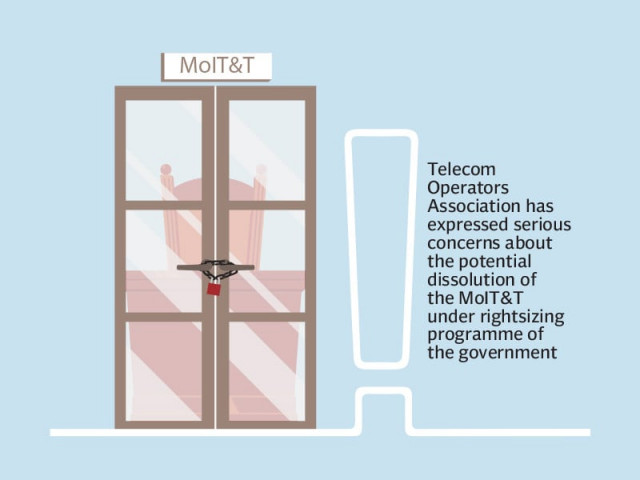IT ministry dissolution opposed
Telecom service providers write letter; seek evaluation of such decision

The Telecom Operators Association has aired serious concern over the proposed dissolution of the Ministry of Information Technology and Telecommunication under a programme for rightsizing the government.
In a letter written to the IT minister, the body of telecom service providers cautioned that it was essential to carefully evaluate the implications of such a decision.
“We would like to submit our comprehensive arguments against the dissolution of the sector’s policymaker and its importance in regulatory oversight, sector-specific expertise, economic impact and strategic significance,” it said.
As a policymaking institution, the association said, the IT and telecom ministry had been the centerpiece of the governance structure, which post-deregulation, separated the policymaker, regulator and operations of the industry in line with the global best practices and Pakistan’s World Trade Organisation (WTO) commitments.
The ministry, after the year 2000, has overseen the evolution of policies and their implementation through stable regulation, which resulted in immense growth of the telecom sector. The policy environment created by the ministry was able to bring a massive amount of investment ($28 billion) in the country’s telecom sector with around $11 billion in foreign direct investment (FDI).
About 195 million telecom subscribers are being served as a result with a tele-density of over 81% of the population. The national exchequer has received around $27 billion in taxes (general sales tax, federal excise duty and withholding tax), licence fee, annual regulatory dues, Universal Service Fund (USF), and Research and Development (R&D) Fund.
“The Ministry of IT and Telecom has played an instrumental role in shaping the country’s information technology and telecommunication landscape,” the association remarked.
Sector-specific expertise
The specialised domain knowledge for managing and nurturing the IT and telecommunication sector is imperative for the sector’s policy and regulatory entities. This focused approach ensures that policies are well-suited to address sector-specific challenges and opportunities.
The dissolution of the ministry, according to the telecom operators, could result in the loss of this expertise over the years, leading to inefficiencies in addressing sector-specific challenges.
Policy implementation and continuity
With a history of effective policy formulation and implementation, the IT and telecom ministry has been instrumental in rolling out policies tailored for the unique needs of the industry, said the association.
This is evident from the market development. The IT and telecom sector thrive on a stable and predictable regulatory environment. The dissolution of the ministry could spark policy and regulatory uncertainty, disrupting ongoing projects and affecting long-term strategic plans.
Economic and developmental impact
The Telecom Operators Association pointed out in its letter that investors were more likely to commit to the sectors supported by a definitive governance structure and a predictable long-term policy environment.
The presence of the IT and telecom ministry, in line with the global inter-governmental mandates and best practices, signals a clear commitment to the IT and telecom sector. Over the past two decades, the telecom sector due to these reasons has attracted an investment of $28 billion into licences and infrastructure.
“The dissolution may create uncertainty about the government’s dedication to these industries, potentially deterring both domestic and foreign investment.”
International commitments
As a signatory to the General Agreement on Tariffs and Trade (GATT) and the Reference Paper on Telecommunications under the WTO regime, Pakistan has international commitments to uphold. These include separating and maintaining an independent policymaker, regulator and operations.
A separate dedicated policymaking entity for the telecommunication sector is imperative to ensure compliance with these commitments.
Impact on stakeholders
Businesses within the IT and telecom sector rely on the ministry for regulatory guidance, support and coordination. The dissolution of the ministry could lead to disruptions in business operations, complicating compliance and strategic planning.
“Clear, stable and predictable regulatory frameworks are vital for business continuity and growth,” the letter said.
It pointed out that if the ministry was abolished and a new entity was formed, it would take a long time to mature. “This transition period has the potential to distract investors and could result in a loss of confidence in Pakistan’s commitment to its IT and telecom sector.”
Public-private partnership
Furthermore, the policy environment driven by the IT and telecom ministry has raised world-standard institutions in the shape of USF and R&D Fund.
Owing to the successful implementation of the public-private partnership (PPP) model for taking telecom services to the un-served and under-served areas as well as the promotion of culture of innovation by these entities, Pakistan’s policy is cited as the best practice in these areas.
These programmes are essential for extending digital services and fostering innovation across Pakistan and require further refinement and policy focus rather than disbanding.
The ministry’s dissolution could slow down progress in these areas, impacting the country’s ability to stay competitive in a rapidly evolving global landscape and will also jeopardise the progress made in achieving the ubiquitous coverage and innovation objectives.
Innovation and digital transformation
The Ministry of IT and Telecom has been a key driver of digital transformation and innovation. Policy, regulatory and implementation capacity to provide the requisite scale and quality of digital infrastructure is needed more than ever before to lay the foundation for a robust and thriving digital economy.
“Enhanced policy focus is surely required to achieve the scale of IT and knowledge exports targeted by the government.”



















COMMENTS
Comments are moderated and generally will be posted if they are on-topic and not abusive.
For more information, please see our Comments FAQ